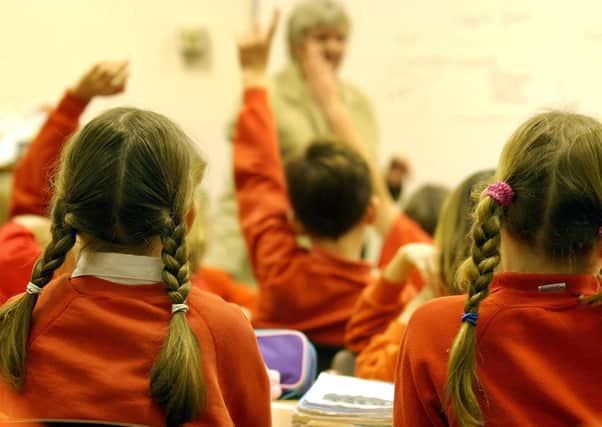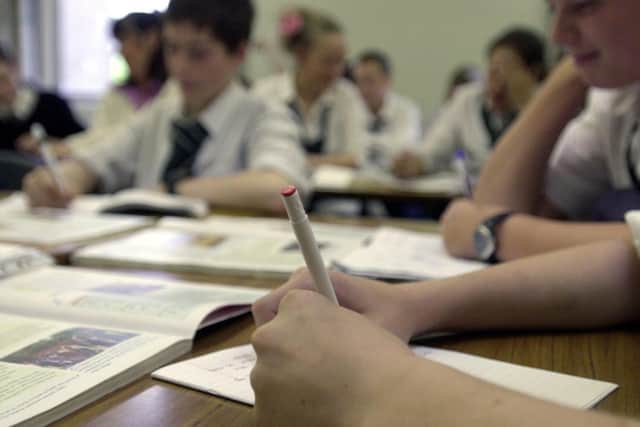‘Build back better’ starts with respecting teachers as new school year dawns – Leslie Newton


These days certainly present us with problems few expected to face at the turn of the year and Covid-19 undoubtedly continues to represent a true crisis, presented in many forms.
We’ve seen heightening mental ill-health and anxiety, and a shocking rise in domestic violence. We’re suffering substantial economic disruption and, in these last few weeks, we’ve faced the prolonged uncertainties around exam results.
Advertisement
Hide AdAdvertisement
Hide AdHere we are, at the onset of autumn, thoroughly aware of these multiple challenges and with some suffering genuine crisis-fatigue. Dare we hope that these crises will all not be wasted; that somehow we really will find a way, drawing on the current mantra, to ‘build back better’?


For that to happen we’ll need to bravely face up to all that we’ve recognised as wrong. The Covid-19 crisis has exposed too many vulnerabilities, inequalities and divisions and highlighted that our society is, in too many regards, ‘ill at ease’.
So, how do we go forwards from here? What does that really mean for the reshaping of society so our communities can flourish and thrive?
Perhaps a good place to start is by exploring some deeper questions about our education system, arising from the exam crises. Are we clear that we are really trying to achieve – and therefore measure – the right things?
Advertisement
Hide AdAdvertisement
Hide AdThe early years of our lives are crucial: they are both life-forming and society-shaping. If we’re going to build back better, we need to be confident about the foundations being laid by our education system.


So, what is the purpose of education?
Recently, the Education Secretary, Gavin Williamson, was quoted as saying “we must never forget that the purpose of education is to give people the skills they need to get a good and meaningful job”.
I think that’s too monochrome a vision, and that we need a richer vision.
For me, this description of the essence of education, produced by the Methodist Church, is more hopeful: ‘The educated person is one who has most nearly attained the potential which he or she has it within them to become, morally, culturally, and spiritually as well as intellectually and physically....Education is not ultimately about training people to be clever or successful, but about discovering what it is to be the full human beings God intended us to be.’
Advertisement
Hide AdAdvertisement
Hide AdAs a Christian, I’m committed to a vision of a society that values every person as unique, precious and full of God-given potential. This demands a view of education that is so much more than just acquiring skills for a job. It is about enabling every human to flourish and find their full potential. It is foundational to the well-being and health of society.
Re-imagining an education system around such a vision won’t be easy. It will demand courageous imagination about how we best embrace and respond to our rich diversity. As a first step, I suggest we must value and appreciate the profession of teaching far more highly than we have in recent years. Teachers need to be trusted and liberated to inspire learningand exploration on a far broader and richer basis than at present.
This needs a long-term commitment to the vocation of teaching as offering every child the attention, input and opportunities they need to flourish. It needs to take seriously every pupil’s unique background and ability.
And the measures of ‘success?’ Alongside high academic achievement by some, will be the broader achievement of every young person reaching adulthood with self-confidence in who they are, a belief that society values them, equipped to live life to the full, ready to contribute their gifts and skills, and hopeful for their future.
Advertisement
Hide AdAdvertisement
Hide AdSuch a ‘build back better’ vision will definitely need much investment, but just imagine the outcome: healthier, kinder, more equal communities. A society where everyone truly plays their part, fewer winners and losers, less anxiety, and lower levels of mental ill-health. I dare to suggest that simply from an economic standpoint the investment would more than pay for itself.
‘It takes a village to raise a child’ says the African proverb. That’s true. But it will also take the dedicated, careful valuing of every child to renew our society, and truly ‘build back better’.
The Rev Leslie M Newton is District Chair of the Yorkshire North and East Methodist District.
Support The Yorkshire Post and become a subscriber today.
Your subscription will help us to continue to bring quality news to the people of Yorkshire. In return, you’ll see fewer ads on site, get free access to our app and receive exclusive members-only offers.
Advertisement
Hide AdAdvertisement
Hide AdSo, please - if you can - pay for our work. Just £5 per month is the starting point. If you think that which we are trying to achieve is worth more, you can pay us what you think we are worth. By doing so, you will be investing in something that is becoming increasingly rare. Independent journalism that cares less about right and left and more about right and wrong. Journalism you can trust.
Thank you
James Mitchinson
Comment Guidelines
National World encourages reader discussion on our stories. User feedback, insights and back-and-forth exchanges add a rich layer of context to reporting. Please review our Community Guidelines before commenting.